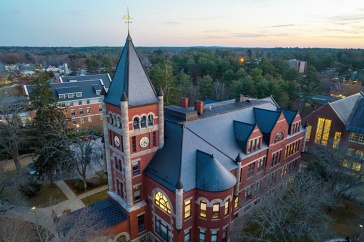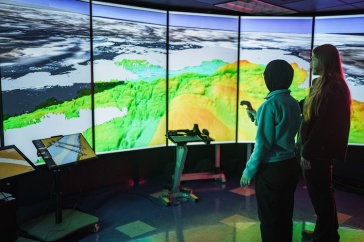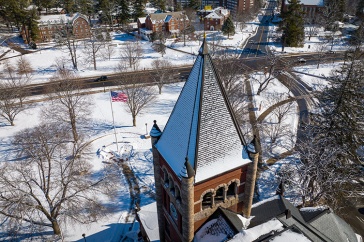
Illustration by Hal Mayforth
What lingers in your mind when you think back to winter 2016… the balmy Christmas Day that saw many in shorts and T-shirts? The April snow that dusted early phlox and daffodils with white? A new study out of the Carsey School of Public Policy indicates that New Hampshire residents who do not believe that human activities are changing the climate were less likely to recall — that the record-breaking month of December 2015, or the winter of 2015–16 as a whole — had been warmer than average. The same held true for individuals who identified as political independents or Tea Party supporters.
In fact, both December 2015 and the 2015–16 cold season were the warmest in Granite State historical records dating back to 1895. And yet just two months after the exceptional December, only 63 percent of residents polled remembered it was warmer than average, and in April, 73 percent of residents remembered the winter had been warmer than average. According to Carsey researchers, New Hampshire residents who think that climate change is a result of human activities were most likely to recall the unusual warmth of December, suggesting that even for such immediate phenomena as recent local weather, climate change beliefs exert some influence on perceptions.
The research was conducted by Lawrence Hamilton, professor of sociology and a senior fellow at the Carsey School, and Mary Lemcke-Stampone, New Hampshire state climatologist and associate professor of geography.
“Although research has convinced most active scientists that humans are changing Earth’s climate, many politicians and a large faction of the public reject this conclusion,” Hamilton and Lemcke-Stampone say.
Science does appear to be making inroads, however. The researchers report that, over the seven years for which they have been conducting surveys with New Hampshire residents about climate change and seasonal recall, public agreement that human-caused climate change is real has risen, from the low 50s in 2010 to about 65 percent in April 2016.
Originally published in UNH Magazine Winter 2017 Issue
-
Written By:
Erika Mantz | Communications and Public Affairs | erika.mantz@unh.edu
















































